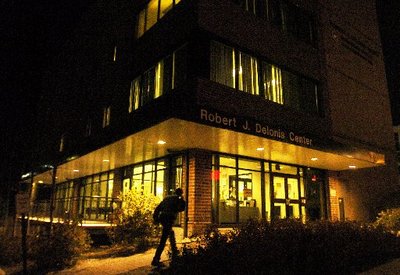Single-digit temperatures have led dozens of homeless people in Ann Arbor to seek refuge at the Delonis Center's overnight warming center, but no one is being turned away.
"We have not had to turn anyone away so far this winter due to capacity," said Ellen Schulmeister, executive director of the Shelter Association of Washtenaw County, which runs the Delonis Center homeless shelter at 312 W. Huron St. near downtown Ann Arbor.
Schulmeister said operation of the shelter's winter programs began Nov. 19, which is when its overnight warming center opened for the season.
The overnight warming center has a capacity of 65 people, and it's been averaging about 47 people per night. It was up to 53 people during an especially cold night earlier this week.
Schulmeister said the numbers the shelter is seeing this year are no different than in past years with normal winter temperatures. However, the numbers are up slightly from last winter, which Schulmeister noted was much milder and allowed more people to stay outside.
Clik here to view.

The Delonis Center's overnight warming center has a capacity of 65 people, and it's been averaging about 47 people per night. It was up to 53 people during an especially cold night earlier this week.
AnnArbor.com file photo
Mayor John Hieftje said at this week's City Council meeting he's glad to say no one in Ann Arbor has had to sleep out in the cold last winter or this winter.
"Ann Arbor has a very advanced system of care for homeless individuals," he said, adding it's one of only two cities he knows of in the state that still funds human services out of its general fund.
"These are very hard times when you have such cold nights," Hieftje said. "But I know all through last year and going into this year, the plan was that no one would be turned away. And they even established a way to accommodate those who may show up under the influence of drugs or alcohol."
Those who want to stay at the Delonis Center's overnight warming center must have a blood-alcohol level of 0.1 or less. Schulmeister said the shelter doesn't test for drugs.
If someone has a blood-alcohol level that exceeds the limit, Schulmeister said the shelter will transport them to what the shelter calls the "engagement center" or to the emergency room. They also can leave and come back when their blood-alcohol level is lower if they choose.
The program runs from 9 p.m. to 7 a.m.
Schulmeister noted the community has made a commitment to move as many people as possible from the shelter's winter programs to housing or into the shelter's regular residential program, which provides intense focus on ending homelessness by moving people to housing.
How can I get into shelter?
Homeless families in Washtenaw County will be assessed for shelter by calling the Housing Access Line at 734-961-1999 Monday through Friday, 8:30 a.m.-5 p.m.
Schulmeister said it's important to note all of the programs mentioned are for individuals without dependent children.
"Families do not have any warming center-type facilities in our community and some are trying to survive in cars," she said.
Julie Steiner, executive director of the Washtenaw Housing Alliance, said she recently became aware of a family living in an unheated garage.
"We do have quite a few families who are homeless," she said.
She said families account for about half the homeless people in Washtenaw County, but most of them are living in shelters or doubled up with other households on a temporary basis. Sometimes that means the children sleep inside and one of the parents stay outside in a car.
Ryan J. Stanton covers government and politics for AnnArbor.com. Reach him at ryanstanton@annarbor.com or 734-623-2529. You also can follow him on Twitter or subscribe to AnnArbor.com's email newsletters.